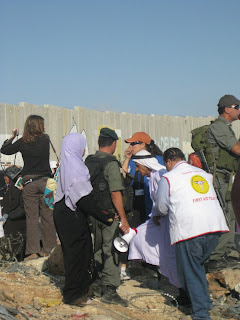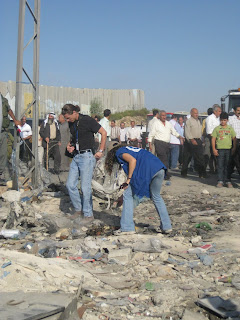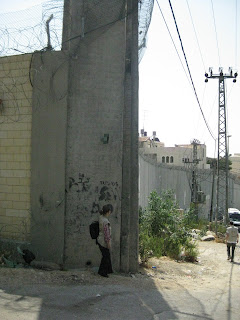It is not easy to get to the hill where Tent of Nations and Daher's Vineyard are located. Me and my colleague Brigitta have to climb across big boulders that are blocking the road. When we get to Daoud Nassers gate we are welcomed by a sign saying we refuse to be enemies in english, german and arabic. It looks a little lonely, laying there in the sand but I feel happy seeing it all the same.
When we reach the top of the hill and wait for Daoud I realize that I am standing on a place surrounded by israeli settlements. I know that Bethlehem is situated across the valley on the other side of the hill but when I turn 360 degrees I count to nine settlements. Neve Daniel is the biggest one. To get where we are we have travelled a good half an hour from the israeli border and are in the west bank, Palestine. Even though I must admit it doesn't look like it.
Daoud does not wait for us at the gate but soon also he comes climbing across the same boulders and explains that he has problems with the settlers. They have blocked his way with the rocks. He shrugs and says that he now has to park his car on the other side but points out that even though this obviously is inconvenient at least the settlers havn't been able to open up a road across his land. Even though they have tried three times. The last time Daound and his brother decided to plow the path and build a low stone wall to prevent acccess. When a car with a confused settler appeared it was politely explained to him that this was private land and that he was trespassing. Daoud hasn't seen him since.
When we enter the area it first appears abandoned. I see a few tents and and two buildings. But soon I begin to see something that looks like car ports leading into the ground. Daoud explains that they are natural caves that his family over time have discovered, excavated and used over the past hundred years. At one time his grandfather even lived in it. Today they are still finding more caves and they are using them as offices, sleeping quarters, meeting rooms andfor workshops.
Daoud then points at a green house and says it is illegal. Just as the green roof across the
outdoor dining area and the beautiful stone terass that we walked across on the way in.
Illegal? I don't understand anything. How can a green house built on your own land be illegal? Daoud explains. This is how it works. Him and his family have spent the past 17 years involved in a legal battle with the israeli authorities about the ownership of the land. Israel claims it is there land and has also declared it state-land. Since Daoud and his family have ownership papers going back to the Ottoman empire they have obviously contesting this.
Daoud doesn't look tired but I realize that he must have told this story many times. 3000 to be exact as this is the number of people who have visited the tent of Nations since it was created as a meeting place and expanded over the years to host both locals and international in different capacities. It has been in existence since 2001.
While neither the land nor the family owning in have changed the political matrix over time has. And even though Daouds family have documentation related to the ownership of the land from not only the Ottoman/Turkish era but also the brittish empire, the jordan state as well as the israeli state it is still being contested by the state of Israel.
In addition to having the legal papers mentioned above in order, the israeli authorities have demanded that his family would go into the archives in Turkey and Great Brittain and bring back documents and aerial pictures from eras long gone, providing them with proof that the land had been used over time and not been abandoned.
This is due to a local law refereed to as the absentee property law giving the israeli state the right to (re-) posess property and land not being used over a period of five years.
Daoud have done what they asked and also provied the state with recent aerial films and photos of the area. They have of course paid all this themselves. And the case is still being processed.
On top of that they are not allowed to build anything on the property nor install electricity or water pipes. And there came the answer to the illegal green house. Instead they get a few hours a day worth of electricity from a generator and have made plans to install solar panels and some kind of alternativ construction using wind power.
Daoud is not a broken man. He has the energy of somebody who have found a life project, something he really believes in. He is enthusiastic and tells us about new plans of expansion. He talks about his life as an accountant, his wife and four children. Without seemingly effort he switches between german and english as he guides us in and out of caves, over to the horse and through the olive grove. He stops for a moment and tells us about the time when people from a nearby settlement came and stole 250 olive trees. Then he continues and tells us how a former volunteer of the Tent of Nations from Holland contacted him soon afterwards. She said that her story about him had so touched her grandmother that she had put in her will that she wanted people to donate to him after her death and would he please accept an equal number of olive tree plants from her now?
Daoud might by now be used to the unexpected but the other week, right before the jewish new year Rosh Hashana he saw a jewish woman from a nearby settlement coming climbing across the boulders. She explained to him that she was a friend of a woman who had visited him the other week and that she had become curious. She told him that she had lived in the settlement for 9 years and never known that she had palestinian neighbours but been under the impression that Daouds hill was part of the settlements that would be used when they needed more land to build on.
When being guided around the land she was very surprised at hearing that they weren't allowed to build or have water installed.
-We have swimming pools at the settlement! she said.
After a few days she again came climbing across the boulders. This time with her husband.
-We just wanted to wish you a happy new year!
Daoud smiles when he tells the story of the settler women. He talks about the value of taking small steps, about creating bridges between people. He says that no matter how difficult life might be for him under the occupation he can still understand how difficult is must have been for her to gather up the guts to go see him and in the end he hopes that she learnt something.
We end the tour sitting under the illegal green roof having a cup of palestinian mint tea. Daoud is full of plans for the future but keeps coming back to the essence of the Tent of Nations. He says he is creating it because it is important for young as well as old palestinians to see what he calls "practical hope" and that there can be Facts on the Ground created by palestinians in a positive non-violent way. We also need internationals to tell our story he continues, and points to the helicopter pad above the sitting area.
-You know, when they are finished building the wall, or seperation fence, around Bethlehem we will be very isolated here. If you don't know the situation for us locals you might think that it it no problem accessing for example my land but you are genrally not allowed to use the road unless you have an israeli registered car. They are building what they call a humanitarian tunnel for us to use instead. And here he starts to laugh
-The helicopter pad was actually used so we could locare the land when we needed the photos of the land but if we need we will of course use it to land on.
I don't know what to think about the future of Daouds family except that I know that I have met a man who has no intention of giving up what he knows is rightfully his.









